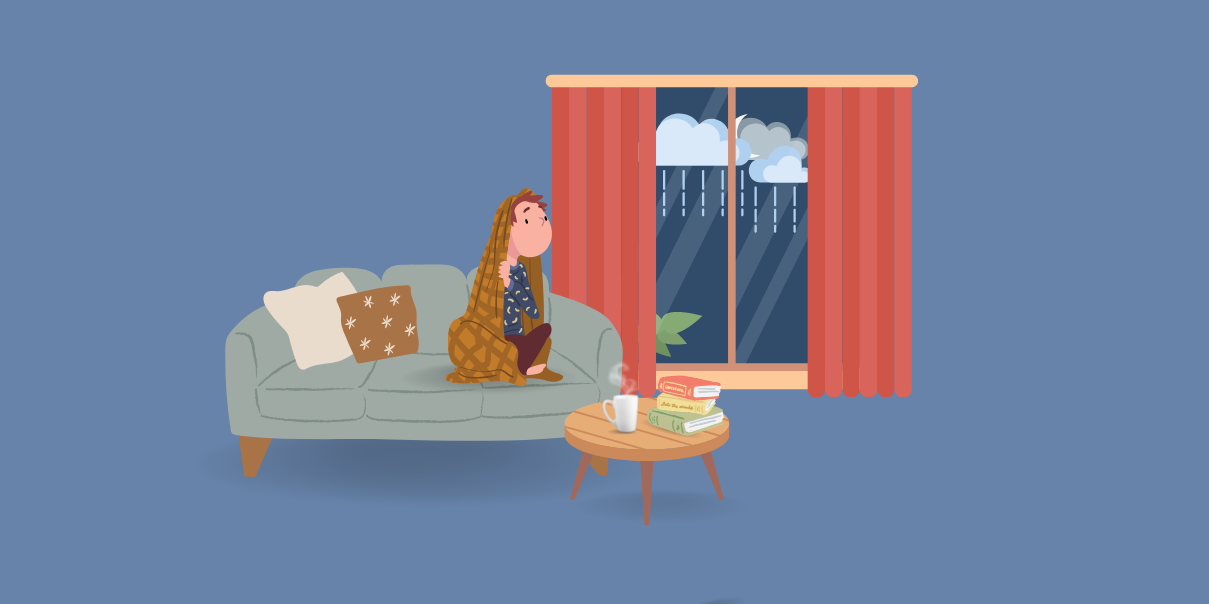 22nd August 2022
22nd August 2022
Five tips for getting through a New Zealand winter
It’s been a long winter, hasn’t it? Even though the smell of spring is just around the corner, many of us here in Aotearoa-New Zealand are still dealing with rain, cold, lack of sunlight, ice on our windscreens, and the low mood that can hit particularly hard when things are grey and dreary outside. This winter has had its own challenges, as we deal with the ongoing effects of COVID and a tough flu season.
If you’ve found yourself feeling a bit more ‘blah’ than usual over the past few months, that’s okay. Experiencing low mood during winter does not mean there is anything ‘wrong’ with you. Life can be very difficult, especially during the colder months, and feeling low can be a normal response to this.
We’ve put together a list of tips, tricks, and advice for getting through the ‘winter blues.’
We hope you find them useful!
1. Hibernate
While humans aren’t known to hibernate like bears do, when it’s bucketing down outside, it doesn’t seem like such a bad idea, does it?
Winter is a time when nature slows down, and the cold, rainy weather is a sign for us to slow down, too.
Sit down with a nice cuppa and a book. Take a bath and pamper yourself. Start your favourite TV show again, or watch that movie that’s been on your list for a while but you haven’t gotten around to yet. Don’t let feelings of guilt creep in about not being as active as usual. It’s important to get enough rest during the winter months, so when spring rolls around again, you’re happy, healthy and rejuvenated!
2. Search for positives
Things may feel heavy during seasonal changes, but there is always something to be grateful for. Each day, aim to write down at least one positive experience, big or small, that happened to you that day. These might include enjoyable events, times you accomplished something or displayed a valuable quality, positive interactions with others, and other small moments of pleasure throughout the day.
The goal is to focus your mind on searching for positives - something it does not naturally do when you are feeling low. The more you train your brain to find the positives, the easier it will get to focus on them in the future!
3. Get some sunlight – or vitamin D
We know it can be hard to get enough sunlight in the winter – especially when the sky is grey outside! Getting enough sun is important in maintaining good overall health, and the UV rays also produce Vitamin D in your body, which helps your overall wellbeing.
So, if you notice an errant sunbeam poking through the clouds over winter, take advantage! If you still feel as though you aren’t getting enough rays, ask your doctor about Vitamin D3 supplements, or look in to investing in a SAD lamp for some at-home light therapy.
4. Keep an activity planner
When life gets difficult or we’re battling with constant ills and chills we can enter into a survival mode where it becomes hard to stay connected to what matters to us. When we’re in survival we can easily neglect self-care or making time for the things that bring us joy or a sense of accomplishment.
It’s important to have things to look forward to each day – and there are plenty of fun activities you can still do during the winter! Going to the movies, going for a walk, starting a book club, or even just going around to a friend’s house for tea can be enough to stave off the winter blues. An activity planning worksheet can be helpful for planning fun things to do – a downloadable .PDF can be found on our website here.
5. Follow the Maramataka
The Maramataka, or Māori lunar calendar, marks the phases of the moon across a lunar month. It has been used in various forms for thousands of years, providing useful information on when to plant seeds, gather seafood, and harvest kai. The Maramataka also notes days of high and low energy, and some people find it helpful to track their moods and plan their activities around the cycles of the moon.
If you are interested in learning more about the Maramataka and would like to follow along with it yourself, our friends at All Right? have plenty of free tools and resources you can use - click here to go to their website.
A lot of these tips come from our free, online CBT course, designed for people with mild-to-moderate symptoms of depression. Cognitive Behavioural Therapy, or CBT, teaches people how to control their emotions, thoughts and behaviour to improve their mental health. If you’d like to learn more, or sign up for this free course, you can do so here:
